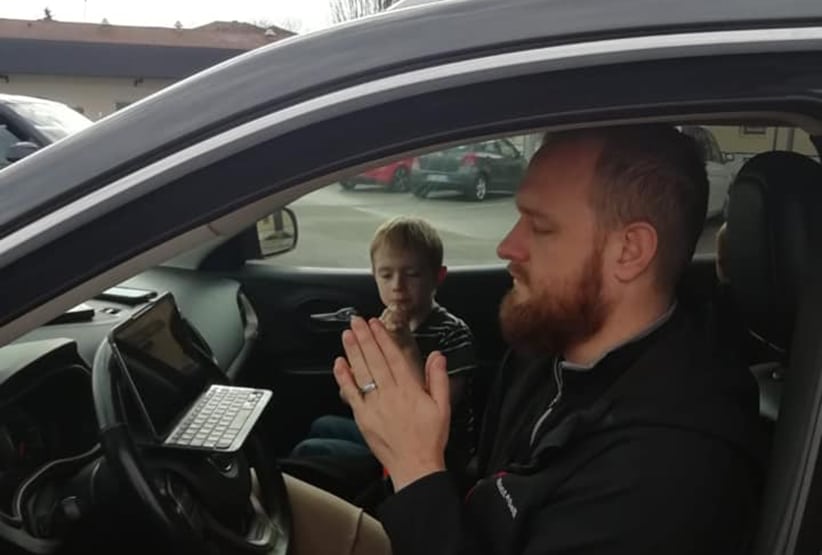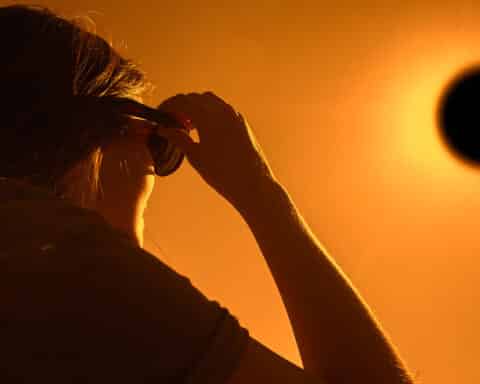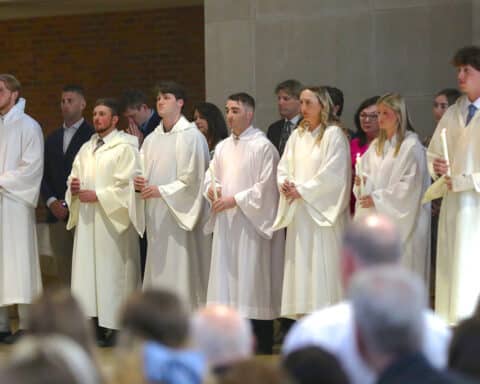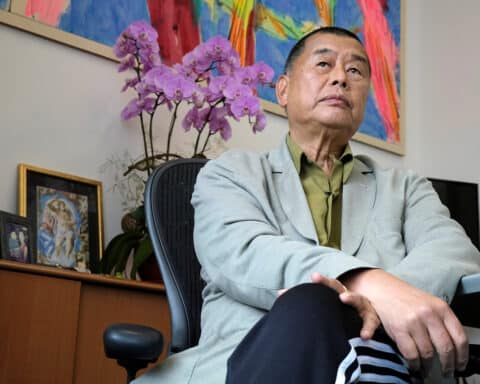On March 9, my family arrived in the parking lot outside of our chapel and watched Mass from a Facebook livestream. At the right moment after the consecration, the people in the parking lot went in, one by one, to receive Communion from our priest. Although it wasn’t normal, I was grateful to receive Communion.
The ordinary form of the Mass is known as the Novus Ordo. In an attempt to be lighthearted with the situation, I took to social media with an image of me in my vehicle with the caption: “This form of Mass shall be known as the ‘Corona Ordo.’ You listen to Mass from your car and go into the church one by one to receive Communion.”
It was humorous, but the quip might have been the result of spiritual buildup for the last couple of weeks of stress. It was the first Mass — it feels odd to call it that — I had been to since Feb. 23.
No large public gatherings
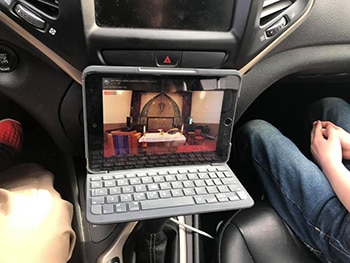
On that day, the political leaders of Italy made a decision to close down places of large public gathering, to include places of worship in response to the recent outbreak of the novel coronavirus. The information moved by the hour, and suddenly, in the first week of Lent, we had no daily Mass, no Ash Wednesday Mass and no Mass the following Sunday. And we knew this situation was the new norm.
|
Want more coverage on coronavirus from a perspective of faith? Sign up for our daily newsletter.
|
Geographically, my family is situated in northern Italy, in the middle of the Veneto region. This puts us right in the center of the coronavirus risk area. Day by day, the news has turned from bad to worse. Only three weeks ago, the virus was generally contained in China, Iran and South Korea. Quickly it went from confirmed cases to three deaths. The next day, seven deaths, after that, 12, then 20. All of a sudden, we are over 13,000 cases and close to 900 deaths. Needless to say, the issue is severe and has caused a high level of caution.
Situations of elevated stress
So how have I reacted? I’m deeply grateful for the life experiences that continue to prepare me for situations of elevated stress. I was present for Hurricane Katrina when I was in the Air Force and elected to stick around to aid in the cleanup mission for months following the destruction. I was awarded the Humanitarian Service medal for that distant part of my life. Later, I would respond to flooding on the Missouri River with the Army Corps of Engineers in multiple years throughout the last decade, memorably the events of severe flooding in 2011. I’ve also been deployed to the Middle East in support of Operation Enduring Freedom and Operation Inherent Resolve.
Few moments have the sheer authority to make you sober as mortar attacks on the walk to dinner, the intensity of a series of rocket attacks or the occasional suicide bomber. After some time, it’s sad to say, these events and the appropriate reaction become familiar — and then normal. Whether a quick rendezvous at this dam to execute a contract that will prevent that city from flooding, or hearing a single note from a siren and rapidly dodging to the ground, I have developed the ability to react sensibly well in a crisis. But you don’t need to be a first responder or a soldier to make a sound judgment.
Every crisis is new. But every crisis is also the same. There are a few constant challenges: lack of information, crudely defined problems, and the requirement to react properly and quickly. For most moments of crisis, there is no manual. There is only experience, judgment and will. We can take all of our training, but that is there to give us a framework, not the solutions. In times of crisis, the survivors are the ones who can assimilate this crude information and react. Perhaps right now, survival is a strong word, but I think Catholics around the world can take a moment or two to ponder the situation, analyze the facts and choose a rational and reasonable response.
Catholic skill set
The Catholic faith, I feel, provides me with a superior skill set of experience, judgment and will in the midst of our recent coronavirus crisis.
When I first read the news of the decision to close the local churches for Mass as a precaution to preventing spillover, I immediately thought of the example of St. Charles Borromeo. “The Life of St. Charles Borromeo,” written by John Peter Giussano, details the various occasions when St. Charles indeed closed churches from the public. For example, he closed St. Bartholomew’s when the people of Milan would no longer celebrate the festival as a Catholic feast but as a public affair. Does that seem like a headline people might balk at? So when the plague visited Milan in 1576, he didn’t hesitate to close churches for public health and safety until zones could be cleared of the epidemic, and he could one by one reopen the churches for public worship. And this was during Christmas. His biographer spares no space to detail the heaviness of this decision and how he argued as much as he could to close the quarantines as soon as possible for the spiritual welfare of his flock. But this didn’t mean Masses were not happening — that is a priest’s daily obligation. It also did not mean the Eucharist was not administered — hosts were delivered as often and as widely as possible.
My reaction also must be balanced when I consider the remarks of friends and pundits online, saying the suspension of Masses is a travesty and that the Eucharist is a supernatural defense against disease. No part of the Church’s teaching on the substance of the Eucharist says that the species provide protection against ailment and illnesses. St. Thomas provides sound judgment: “If it be discovered that the wine has been poisoned, the priest should neither receive it nor administer it to others on any account, lest the life-giving chalice become one of death” (Summa, III, 83, iii, Article 6).
Decision-makers
It’s stunning also when I read of the callous attacks on the clergy, referring to them as cowards and wimps for suspending Mass, contrasting them with the bravery of the early Church and martyrs. When, in fact, the earliest Christians were driven to have secret Masses in their homes for decades or would use the tombs of the deceased as altars in the catacombs outside the city walls. They, too, understood the responsibility of staying alive and keeping the faithful safe. The same has happened in other generations. Read Francois Trochu’s “The Cure D’Ars” on St. John Vianney, and there are numerous cases of brave, outlawed priests who hid for years in order to minister to the faithful. Or the priests of Toulouse and Carcassonne (France) in the Middle Ages who chose to close their churches and serve underground as to avoid martyrdom at the hands of the Albigensians so that they may keep hope alive for the faithful of the region. Examples of secret Masses and closed Church doors fill our history books.
And what about these priests and bishops who make these decisions? What heartbreak I imagine they must endure. What a martyrdom of its own kind to not administer the sacraments as fully and as gloriously as they deserve. Our clergy facing these decisions deserve our deepest respect and most fervent prayers.
Finally, our Church has a wonderful magisterium on the will. We know that the supreme law is the law of charity, of love. This means that above all matters, love must triumph. And there’s a simple word picture that raises this idea to life. Imagine you are walking to Mass and in your immediate sight — boom — two cars collide in a perilous crash. There are obvious injuries. Are you compelled to go to help them, or to go to Mass? I think you know the answer: Love must triumph.
Containment and cooperation
It may be an imperfect analogy, but it fits our current situation because it emphasizes the most singular example of the dilemma between going to Mass and aiding others. I do not believe that the coronavirus is a matter of alarmism or cowardice: For a significant portion of our population, it is a matter of survival, and for medical professionals, it is a matter of allowing them to do their job. For the rest of us, it is a matter of containment and cooperation.
I’ve been willing to cooperate. Most of the community in this affected region have, as well. My post about the Corona Ordo was for humor, but also for people to see what we are dealing with. And here’s the point: We’re dealing! We’re not moping, and nobody is fighting. We’re taking the situation God has handed us and we’re moving forward in whatever ways we can to receive the summit of our Faith: the holy Eucharist. It might be odd. There might even be a better way. But I’m proud of this Catholic community for banding together and finding solutions in a moment where there are few options. Please pray for us.
Shaun McAfee is the author of “I’m Catholic, Now What” (OSV, $19.95) and writes from Vicenza, Italy.

